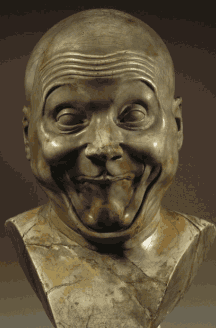I]
I knew Robin Williams. Not well, we were in different cohorts at the Juilliard Drama Division, but it was a very tight group; I knew him just enough to follow his career with little sympathy but a deep, long-lasting empathy based on a common experience. This could have been me, minus the particular talent and surely without the drive: I made the decision, early on, that Robin Williams was not someone I'd want to be; after that I followed his career from a safe distance. Not safe enough, apparently to be left untouched by his self-punishing suicide last week.
There's a cardinal rule in Acting Improvisation: if your partner tells you he's a purple bear in tennis shoes you never, ever tell him, "No, you're not." Williams was the guy who'd tell you, "No, you're not." Guys like that end up as stand-up comics because they're too competitive to work with anyone else; Williams, to the end of his life, was a stand-up comic trying (successfully at times) to be something more. Trying (not successfully in the end) to be the guy who plays well with others. Stand-up comedy is to acting what masturbation is to lovemaking: the quick and easy way out from the difficult part, which is inter-acting with others.
Freud, too, had something to say about the Sufferings of Genius, except it was a Genius for a different time. The Badass Doctor wrote that Leonardo's commitment to his work was primarily a form of repression and diversion of affect, from humans to ideas or work. But then it's commonly acknowledged, even by Freudians, that Freud was writing for a different era with different psychic configurations. Today's Genius (si lick it in parva) is the one who commits to the dark, lonely job of sharing with one and all: a narcissist's narcissist. Then again, even narcissists have something to repress, never more so when they appear to be expressing all over the map. And we've seen an extraordinary outpouring of repression this past week over Williams' suicide: it reminds me of Freud's comment about the kind of diversion of affect that's involved in Group Psychology: not repression of affect but affect itself as a form of repression.
Juilliard was no help: the idea was to turn the actor into some kind of robot, an Über-Marionette with all of the technique but none of the pesky personal input that's required in Method Acting. Not that this makes a difference in the long run anyhow: actors are not paid to have feelings or values, but to act out the feelings of others. As the head of the Drama Division, John Houseman, explained to me, "You don't really want to be an actor, all actors are stupid." A few months later he won his Oscar for Best Supporting Stupid, so I have to conclude that stupidity is not a character trait of actors but a job requirement, and that can be tough if you're not stupid.
Even before Juilliard I'd made the decision that I really didn't want to be an actor anyhow. I was in acting class with Bill Hickey, and I'd come in loaded for bare: to use an expression recently applied to Williams, I was going to be an emotional geyser. Bill stopped me two minutes in, informed me, first, that this wasn't acting at all, that acting involves a certain way of putting a distance between what one pretends to be and what one is. Second, that this type of acting was the surest way to destroy oneself emotionally. Unfortunately he never told me how to structure the distance and I never taught myself; neither at Juilliard nor later at the Actors' Studio. Nor did Bill point out that destroying oneself emotionally is the surest way to succeed in America: whatever the job, no worker can ever give enough of himself. Williams chose to be some kind of an actor athlete, a Stakhanovite Hero of American Entertainment, the John Henry of Juilliard. No wonder there's been such a so-called outpouring of affection: we're all John Henrys, aren't we?
The nice thing about repression according to Freud is, we can all identify without having to identify what we're identifying with. And destroying oneself as a pay grade is not something Americans like to think about: they'd rather think it's an unfortunate side effect, a character defect, incidental to the job description. That a so-called successful worker in America might be destroyed by his job and not in spite of it, is intolerable. As the Times put it, in a typical Timesdenial headline: "Busy Working, Robin Williams Fought Demons." As opposed to fighting the Demons of Busywork?
II]
In the Preface to Miss Julie August Strindberg lays out the particular nature of the relationship of actor and audience under capital (which happens to be the relationship of the two protagonists in the play):

As Sartre put it: the actor knows he's not Hamlet and so does the audience; yet actor and audience meet at that point where they allow one another to pretend that the actor is Hamlet after all: the Eternal Hamlet. The actor's challenge in a bourgeois society (and the problem behind every job) is the individual's struggle to affirm himself as more than he appears in the face of a system that demands that he be no more than he appears to be: the only great actors are the ones who outwit their audience. I once sat three rows away from Vanessa Redgrave in a performance of Antony and Cleopatra; because I know the play almost by heart (a benefit of acting school) I was following the way one follows music, with tears streaming down my face. Suddenly, for a split second, Redgrave broke out of character to cast an appalled glance my way, and went back on track. Contrariwise, the successful actor in bourgeois society is the one who rehearses, endlessly and to the exclusion of everything else, the role that bourgeois society wants him to rehearse, until there's no actor at all: there's something of the horror of Tragedy when an actor who for decades has played at high anxiety dies of the anxiety he's nurtured; when someone who played at being hyperkinetic on stage finds himself facing Parkinson's. Strindberg again:
Robin Williams died for your sins.
subscribe:
Like an RSS feed or Twitter, only easier: you drop me a note and every week or so I send you a short message with a link to my latest posting; other stuff, maybe every other month.
donate:
Because paying no dues to Caesar is the one luxury that's not encouraged in a consumer society. Easy: you paypal me a buck or two.
comments:
And you don't have to sign up to post them; they are moderated, though.
